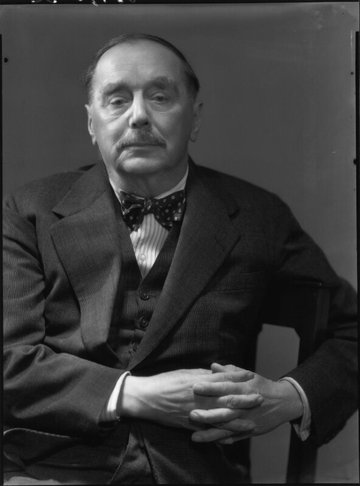
H. G. Wells
‐
Writer and social critic
Other names
Herbert George Wells
Place of birth
Place of death
London
About
H. G. Wells was an author, intellectual and social commentator. Marking the transition from the Victorian to the modern era, he made his name as a writer of utopian and dystopian science fiction novels. In later years he became increasingly noticed as a social commentator, which would overshadow his career as a playwright and novelist. His connections with South Asians in the UK were tentative; however, Wells was incredibly well connected to a number of networks that had extensive links to the South Asian community in Britain, most notably through the Fabian Society.
Wells was openly critical of British imperialism. After the massacre at Amritsar in 1919, Wells concluded that the incident was an example of the failures of the British imperial system, which had not fostered interaction between the British colonial masters and Indian subjects. He concluded that ‘no race is fit to have the upper hand over any other race; the possession of the upper hand leads at best to an inconsiderate self-righteousness and at the worst to an extreme contempt and cruelty’ (quoted in Foot, p. 195).
H. G. Wells’s writings influenced the young dramatist and novelist Aubrey Menen, who was granted permission by Wells to adapt The Shape of Things to Come for his drama society while studying at the University of London. Wells was impressed by the young Menen and deliberately risked a confrontation with the film producer Alexander Korda, who had just acquired the film rights for the novel. Wells’s A Short History of the World provoked a hostile reaction among South Asians in Britain. The Jamiat-ul-Muslimin organized protests against the book in 1938, leading the Indian High Commissioner Firoz Khan Noon to intervene.
In 1941, Bhicoo Batlivala approached Wells to speak on the Subject Charter at the India League meeting in October. Krishna Menon sought to enlist Wells’s support on the question of Indian independence and to raise the profile of his pressure group. In 1941 Wells had written an open letter to Sir Hari Singh Gour, who had sent him his pamphlet ‘Truth about India’. In the letter Wells highlighted the ill-treatment of Nehru and called for Indian self-determination. Wells was particularly interested in the treatment of Nehru and sent a number of letters to the India Office in 1941. However, their response was less than satisfactory. Wells was privately engaged in conversations with Lord Amery, Secretary of State for India, about Nehru, worried about his treatment as a political prisoner. This led Bhicoo Batlivala to pursue Wells on behalf of Menon. She persuaded Wells to attend a private India League meeting to discuss the position of India and the Atlantic Charter, held at the Savoy Hotel on 23 October 1941, after he had declined invitations to speak at one of the organization's public meetings. From 1934 to 1946, Wells was the President of the writers’ organization International PEN. Wells died in London on 13 August 1946.
Attended East India Association lecture given by Mrs N. C. Sen on Tagore at Caxton Hall, 29 May 1917
Mulk Raj Anand, Bhicoo Batlivala, P. C. Bhandari, Fenner Brockway, Hsiao Ch'ien, Kedar Nath Das Gupta, Michael Foot, Ford Madox Ford, E. M. Forster, C. E. M. Joad, Alexander Korda, Wyndham Lewis, Aubrey Menen, Krishna Menon, Ranjee G Shahani, George Bernard Shaw, Rabindranath Tagore, Edward J. Thompson.
Selected published works:
The Stolen Bacillus, and Other Incidents (London: Methuen & Co., 1895)
The Wonderful Visit (London: J. M. Dent & Co., 1895)
The Island of Doctor Moreau (London: W. Heinemann, 1896)
The Wheels of Chance: A Holiday Adventure, etc. (London: J. M. Dent & Co., 1896)
The Invisible Man: A Grotesque Romance (London: C. A. Pearson, 1897)
The Plattner Story, and Others (London: Methuen & Co., 1897)
The War of the Worlds (London: W. Heinemann, 1898)
God The Invisible King (London: Cassell, 1917) [mentions Rabindranath Tagore's poetry]
The World Set Free: Essays (London: Ernest Benn, 1927)
Foot, Michael, H. G.: The Story of Mr Wells (London: Doubleday, 1995)
Parrinder, Patrick., H. G. Wells (Edinburgh: Oliver & Boyd, 1970)
Parrinder, Patrick (ed.) H. G. Wells: The Critical Heritage (London: Routledge & Kegan Paul, 1972)
Parrinder, Patrick (ed.) H. G. Wells: Literary Criticism (Sussex: Harvester Press, 1980)
Parrinder, Patrick, ‘Wells, Herbert George (1866–1946)’, Oxford Dictionary of National Biography (Oxford University Press, 2004) [http://www.oxforddnb.com/view/article/36831]
For image and copyright details, please click "More Information" in the Viewer.
Image credit
H. G. Wells by Bassano Ltd, half-plate film negative, 17 June 1939, NPG x127598
© National Portrait Gallery, London, Creative Commons, http://creativecommons.org/licenses/by-nc-nd/3.0/
